Xi meets Egyptian President Abdel-Fattah al-Sisi
Xi meets Egyptian President Abdel-Fattah al-Sisi
Xi meets Egyptian President Abdel-Fattah al-Sisi

US President Joe Biden's new national security memorandum, which directs national security agencies to leverage AI in competition with rivals, underscores the US' hegemonic act of securing a dominant position in this sector. However, Chinese experts cautioned that a broad interpretation of national security will potentially hamper global AI industrial cooperation and be used to stigmatize other countries.
Biden issued a national security memo on artificial intelligence on Thursday, entitling the Pentagon and US intelligence agencies to more quickly embrace and deploy artificial intelligence as a matter of national security, VOA reported.
The memo pushes hard on the use of AI, including bringing in more overseas workers with AI expertise, setting up facilities to accelerate US research and securing the AI supply chain against foreign meddling, according to Politico.
Treating the emerging technology as a key arena for global competition, the US seeks to maintain its development by establishing specific barriers that will help it retain a dominant technological advantage in the sector, Li Baiyang, an associate professor of intelligence studies with Nanjing University, told the Global Times.
Meanwhile, as countries compete to excel in AI security governance, the US is working to set rules for utilizing this technology and encouraging other nations to follow suit, with the goal of gaining international influence in AI security governance, Li said.
As China's AI sector booms, the US government has become acutely aware of the competitive pressure exerted by its biggest rival.
VOA said the memo seeks to "prevent the country from falling victim to AI tools wielded by adversaries like China," while Politico states that it "creates new policies to compete with China."
Experts stated that China will not interfere with other countries' internal strategic decisions, but cautioned that the memo could be used as a tool to obstruct global AI cooperation and to stigmatize other nations.
President Biden also directed agencies to help US firms protect AI technology from foreign spies. The White House statement claims "Our competitors want to upend US AI leadership and have employed economic and technological espionage in efforts to steal US technology."
This memorandum makes collection of intelligence on its competitors' operations against the US AI sector a top priority, and directs relevant US government entities to provide AI developers with the timely cybersecurity and counterintelligence information. It also bans agencies from using AI if they "do not align with democratic values."
The US has already begun to implement some of the parameters outlined in the memo, such as applying AI to intelligence collection, while simultaneously urging others not to misuse the technology, a Beijing-based security expert who wished to remain anonymous told the Global Times on Friday.
In this way, Biden and his team believe that explicitly outlining these hidden rules will elevate their moral standing and allow them to point fingers at others and contain their actions, the expert stated.
Li said that further expanding the antenna of national security into AI industrial development will potentially interfere with international cooperation on this cutting-edge technology, including with China, as we are currently seeing an intensifying US crackdown on Chinese products.
The US government will reject collaboration with other countries if they fail to adhere to the rules it sets, which presents a difficult choice for nations that are already falling behind, potentially broadening the technological gap, the anonymous expert added.
While the US further intertwines their intelligence departments with these internet companies, AI users will be compelled to cede and share a great deal of personal information, the expert mentioned above said. "We should recall the alarm we felt when Snowden revealed the extent of the US government's illegal internet surveillance. Now, we should consider how AI technology might be utilized by the US government as a tool for global surveillance."
The memo establishes deadlines for future actions that will extend long beyond Biden's tenure. It remains uncertain how Donald Trump or Kamala Harris will handle the policies if they are elected president, observers said.
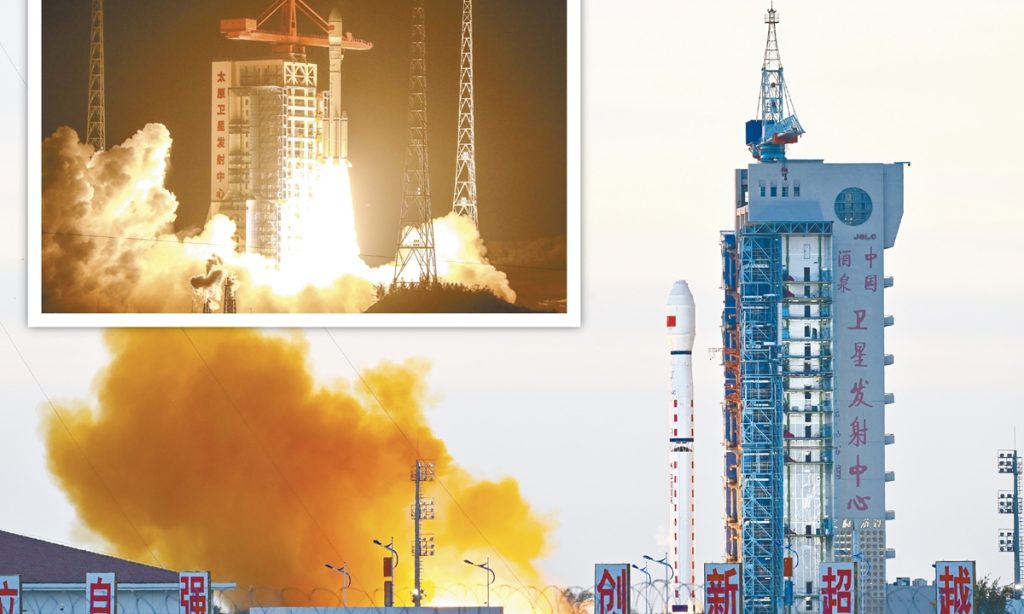
Within just 12 hours, China successfully launched 18 communication satellites and a remote sensing satellite into their designated orbits, in two separate missions on Tuesday evening and Wednesday morning. Chinese space watchers view this achievement as a testament to the country's growing expertise in space technology and increasingly strong capabilities of space applications.
China launched the Gaofen-12 05 remote sensing satellite via a Long March-4C carrier rocket from the Jiuquan Satellite Launch Center in Northwest China's Gansu Province at 7:45 am on Wednesday.
Earlier, China successfully sent 18 communication satellites for the Qianfan network into their designated orbit via a Long March-6A rocket from the Taiyuan Satellite Launch Center in North China's Shanxi Province on Tuesday at 7:06 pm.
Both the remote sensing satellite and the Long March-4C rocket used in the Wednesday launch were developed by the Shanghai Academy of Spacecraft Technology (SAST), a Chinese space agency and subordinate of the China Aerospace Science and Technology Corporation (CASC), China's primary space contractor.
The Global Times learned from the SAST that the Gaofen-12 05 satellite will be used in a variety of fields including land surveys, urban planning, road network design, crop yield estimation and disaster relief.
Previously known as the G60 network and dubbed the "Chinese version of starlink," the Qianfan network is intended to provide high-speed, secure, and reliable broadband internet services to users around the world. According to its design plan, by the end of 2030, the network will be made up of more than 15, 000 satellites traveling in low-altitude orbits.
The establishment of the Qianfan constellation is expected to accelerate development in markets such as mobile innovation, autonomous driving, disaster prevention and reduction, and the Internet of Things, creating significant opportunities for the satellite internet industry, observers said.
The latest two successful launches were hailed by Chinese space watchers as demonstrating China's growing expertise in space technology and increasingly strong capabilities of space applications and this achievement reflects the commitment of China's aerospace workers in upholding the spirit of the "Two bombs, One satellite."
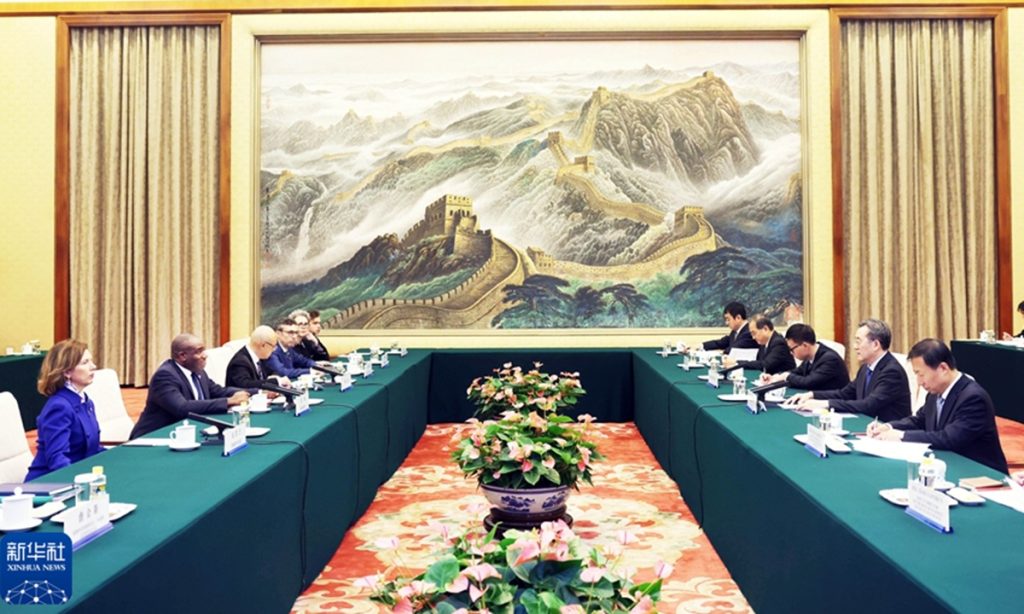
Senior Chinese officials on Friday met with the new UK foreign secretary David Lammy in Beijing, with both sides underscoring the willingness to promote pragmatic and mutually beneficial cooperation, which analysts viewed as a window for repairing and improving relations despite uncertainties.
Lammy's visit, from October 18 to 19, is the first to China by a UK Cabinet minister under the new Labour government.
During his stop in Beijing, Lammy met with Chinese Vice Premier Ding Xuexiang on Friday.
Ding, also a member of the Standing Committee of the Political Bureau of the Communist Party of China (CPC) Central Committee, said that China is ready to work with the UK to further develop a more stable and mutually beneficial bilateral relationship from a strategic and long-term perspective and promote the upgrading of pragmatic cooperation in various fields, thus better benefiting the two countries and the two peoples and injecting more momentum into world peace and prosperity.
Chinese Foreign Minister Wang Yi, also a member of the Political Bureau of the CPC Central Committee, held talks with Lammy on Friday as well.
Wang said that China agrees to fully resume dialogue and cooperation mechanisms in various fields and actively carry out mutually beneficial cooperation in trade, finance, green development, science and technology, health, education and people-to-people exchanges.
Wang said major power competition should not be the backdrop of this era, and China is ready to work with the UK to take openness and cooperation as the main theme, deepen strategic communication, promote practical cooperation and push China-UK relations into a new stage of stable development.
For his part, Lammy mentioned that the UK looks forward to strengthening exchanges and dialogue with China at the top and other levels, expand cooperation in areas such as climate, energy, science, trade and tech.
He noted that the British government is committed to effectively managing differences with China in a coherent, mutually respectful manner that serves the long-term interests of both sides. And the UK and China share extensive common interests and there should be no "iron curtain" between the two countries.
Lammy said the British side honors its commitments on the Taiwan question made at the time of the establishment of diplomatic relations with China and will continue to do so in the long term.
Analysts said that despite Lammy's visit is not enough to mark a full-scale warming of China-UK relations, it could be a preliminary and vital step toward normalization and reviving of ties.
Given the lukewarm or even frosty ties in the past few years, it's unrealistic to expect very concrete or groundbreaking results from Lammy's visit, Cui Hongjian, a professor at the Academy of Regional and Global Governance at Beijing Foreign Studies University, told the Global Times.
However, during this visit, China and the UK have made further progress in restarting the dialogue mechanism, committing to implement the important understandings reached between the leaders of the two countries during their phone call in August, and strengthening economic and trade ties, which will play a positive role in reviving bilateral relations, Cui noted.
According to the official release, Lammy is expected to meet with British business leaders in Shanghai to discuss how economic links with China support growth in the UK, after meeting with senior Chinese officials in Beijing.
"The UK is to take a stable, consistent and pragmatic approach to China, with engagement vital between two global players," said a UK foreign office press release ahead of Lammy and Wang Yi's meeting on Friday.
While the visit is expected rebuild mutual trust and strengthen communication, there is still uncertainty about how dynamic and sustainable Keir Starmer's administration's "pragmatic approach to" China will be, said Cui.
Enough political wisdom is currently required for the Starmer administration to maintain a balance among domestic political forces, and they also need courage to reform and avoid "backing down" on the cooperation and engagement stance due to the negative public opinion atmosphere in the UK toward China, Cui said.
Sam Hou Fai wins enough votes for Macao SAR Chief Executive designate.
Chinese President Xi Jinping has extended greetings to the elderly on the eve of the country's Seniors' Day, which falls on Friday this year.
Xi, also general secretary of the Communist Party of China Central Committee and chairman of the Central Military Commission, expressed the hope that the elderly are well provided for, enjoy their lives, and continue their pursuits.
Xi made the remarks in a letter to representatives of seniors who participate in a national voluntary initiative.
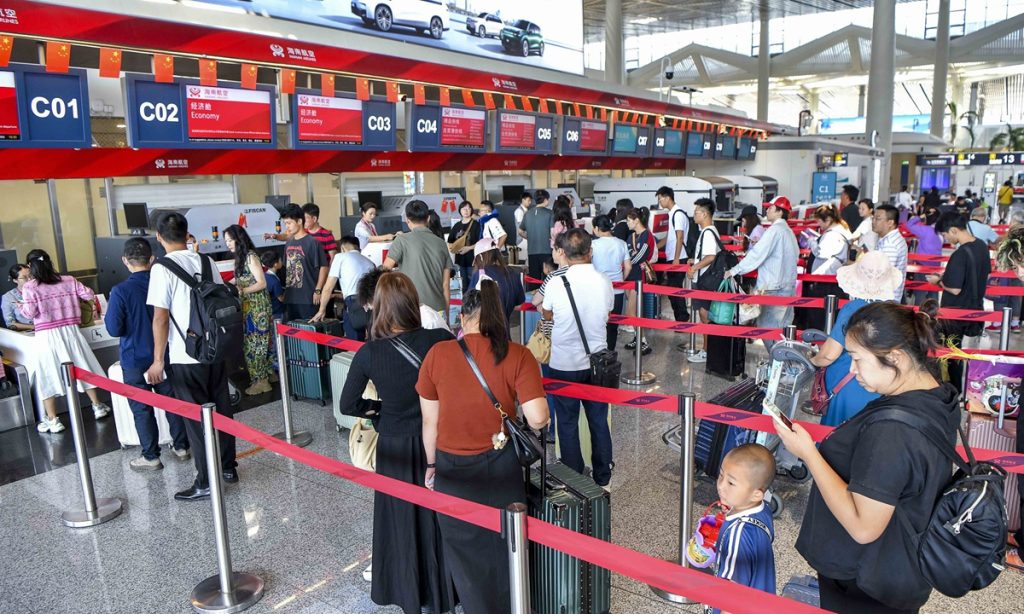
Chinese airports have maintained the travel fever since the week-long National Day holidays kicked off, and the visa-free policy, along with frequent flights, continues to boost inbound and outbound travel.
Civil aviation passenger volumes have exceeded 2.2 million trips per day for three consecutive days since the holidays began on October 1, according to data from the Ministry of Transport.
Beijing Daxing International Airport is expected to handle 146,900 inbound and outbound passenger trips on Friday, with over 1 million trips anticipated throughout the holidays, according to airport data.
The two airports in Shanghai are expected to transport nearly 370,000 passenger trips per day on average, an increase of 14.4 percent compared to the same period last year.
The travel boom is not limited to first-tier cities. During the National Day holidays, the number of inbound and outbound passengers at Harbin Taiping International Airport is expected to reach 14,000, with the number of inbound and outbound passenger flights totaling 100, an increase of 41.9 percent and 1.1 percent year-on-year respectively.
Outbound air tickets and hotel bookings for the National Day holidays have spanned 1,597 cities in 144 countries and regions, data from the travel platform qunar.com showed. When examining the cities with the highest number of outbound air ticket orders, it's notable that all of them are within a 5-hour flight radius. The top five cities are Hong Kong, Bangkok, Kuala Lumpur, Seoul, and Osaka.
Hong Kong and Macao remain highly appealing. The Immigration Department of the Hong Kong Special Administrative Region estimates that about 10.03 million people will pass through Hong Kong's sea, land and air control points from September 28 to October 7.
Thanks to the 144-hour visa-free policy, inbound tourism has grown rapidly. Traditional domestic tourist cities such as Guangzhou, Xi'an, and Zhangjiajie have continuously added new international routes, attracting a large number of foreign tourists to China.
The source of inbound tourists to Zhangjiajie, which bears a striking resemblance to the landscapes depicted in James Cameron's film Avatar, located in Central China's Hunan Province, has increased from 133 countries and regions in 2019 to 171 now.
Meanwhile, cruise travel is also playing a significant role in outbound travel.
Da Wang, a Beijing-based tourist, chose a seven-day cruise tour to the cities of Japan. She told the Global Times on Friday that she was surprised to see at least 40 buses leaving the Fukuoka port in Japan when she disembarked at her first stop on Thursday. Each bus was full of 50 Chinese travelers, and there were many tour guides holding signs waiting for the Chinese tourists, Da said, noting that "it is quite spectacular."
Experts believe that the booming inbound and outbound tourism reflects the strong pulse of the holiday economy. They assert that this trend will further drive economic development, and as people's demand for travel experiences continues to grow, the future holiday economy is likely to become more diversified and enriched.
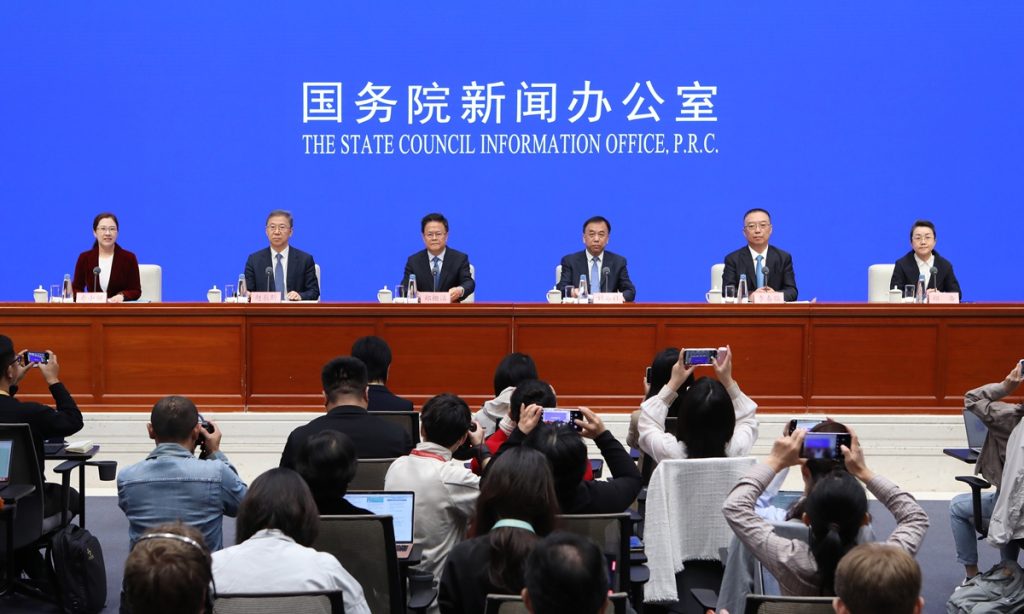
The National Development and Reform Commission (NDRC), China's top economic planner, vowed on Tuesday that it will step up efforts to introduce a package of incremental policies, including an emphasis on scaling up macro counter-cyclical adjustments, boosting domestic consumption, and shoring up capital markets - among others - as part of the efforts to steadily promote economic growth.
Observers said the remarks, coming on the first working day of the fourth quarter, underscore Chinese policymakers' strong resolve to address economic challenges head-on and to sustain economic recovery in the rest of the year. It also sheds light on the ample policy toolkits the central government has in hand to deal with complex internal and external environments, they noted.
The support adds to a series of pro-growth policies rolled out since late September, which further lifts social expectations and market confidence. A consumption spree was witnessed during the just concluded weeklong National Day holidays in addition to a stock market rally which has lasted for several consecutive days.
Wide-ranging policies
"In response to the new situations and issues in the current economic operation, China will intensify efforts to introduce a package of incremental policies to promote sustained economic recovery and improvement," NDRC head Zheng Shanjie said on Tuesday.
The remarks came at a highly anticipated press conference of the State Council Information Office on Tuesday. In addition to Zheng, other four NDRC deputy heads attended the press conference, which some economists said was a "rare case" and shows that the "incremental policies will take effect on all fronts."
Zheng in particular highlighted five aspects, including strengthening counter-cyclical adjustments in macroeconomic policies, focusing policies on improving livelihoods and boosting consumption, more support to help businesses facing difficulties, more efforts to stabilize the real estate market, as well as more efforts to shore up capital markets.
"The slew of policies are targeted, not only serving as an effective response to the current emerging economic downward pressure, but they also represent a strategy to achieve China's high-quality development in the long-term," Zhu Keli, founding director of the China Institute of New Economy and executive director of the China Information Industry Association, told the Global Times on Tuesday.
The wide-ranging measures coordinate policy priorities of this year with next year, which also carry great significance for the healthy and sound development of the economy in 2025, as well as the successful delivery of the 14th Five-Year Plan (2021-2025) targets, Li Qingbin, a research fellow at the Institute of Economic Research under the NDRC, told the Global Times on Tuesday.
On September 26, the Political Bureau of the Communist Party of China (CPC) Central Committee held a meeting to analyze the current economic situation of China and make further plans for economic work. The meeting called for effectively implementing existing policies, stepping up efforts to "roll out incremental policies" and further making policy measures more targeted and effective.
"From setting a direction to systematic implementation, we're seeing clear and concerted efforts. Those moves send a resounding signal of Chinese policymakers' determination to stabilize growth and achieve the annual growth target," Tian Yun, a veteran economist based in Beijing, told the Global Times on Tuesday.
During the press conference, Zheng used two keywords to summarize the status quo of the Chinese economy: "steady" and "progress." He expressed full confidence in China achieving the tasks and the goals set for economic and social development in 2024.
Rising confidence
According to Tian, a policy introduction on Tuesday, the first working day after the weeklong National Day holidays, plays a vital role in properly guiding social expectations over the prospects of the world's second-largest economy.
China's A-share market experienced another significant surge on Tuesday. The ChiNext Index recorded its largest single-day gain on record, while total trading volume on the Shanghai and Shenzhen stock exchanges reached 3.45 trillion yuan ($488.9 billion), an increase of 860 billion yuan from the previous trading day, setting a new historical high.
Alongside the stock market rally, Chinese assets are witnessing increasing fund inflows from foreign investors, while a number of foreign institutions have upgraded their predictions for Chinese stocks.
Goldman Sachs Group forecasted in early October that gauges tracking China's equities may rise another 15 percent to 20 percent if "authorities deliver on policy measures." Morgan Stanley also forecasted at least another 10 percent stock-market rally in the near term.
According to Bloomberg, inflows to five US-listed leading ETFs that invest in Chinese stocks received about $4.9 billion in cash in the week ended October 4, the most on record.
"Recent stimulus policies have put an emphasis on maximizing the synergy effect between different policies, including fiscal, financial, consumption, investment and property ones," Li Qingbin said. Analysts expect the country's top economic planner to play the role of a policy coordinator between different departments.
According to Zheng, with regard to fiscal policies, China plans to roll out more investment projects, including front-loading 100 billion yuan ($14.2 billion) from next year's central government budget and another 100 billion yuan to be used for key investment projects by the end of this year.
Additionally, the 1 trillion yuan of ultra-long special treasury bonds, which fund major national strategies and support security-capability as well as support large-scale equipment upgrades and trade-in of consumer goods, has been fully allocated to the projects and local governments, Zheng said, noting that China will continue issuing ultra-long special treasury bonds in 2025.
Tian said he expects more policies with "greater strength and intensity" could be rolled out, depending on how the Chinese economy operates in the fourth quarter and the evolving downward pressure.
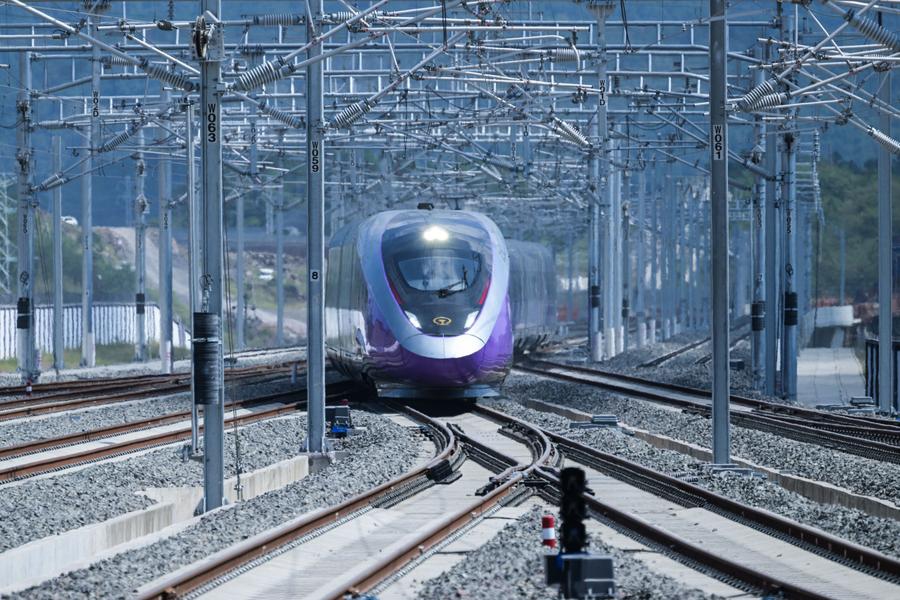
During the week-long National Day holiday ending on Monday, China's high-speed railway stations were often bustling with crowds. Some passengers could be seen lined up in an orderly fashion as they prepared to board, while others could be spotted browsing their smartphones or using laptops when waiting for their boarding calls.
The country's railway sector experienced a surge in passenger traffic on Monday as travelers returned home from their holiday destinations.
A total of 13,103 trains were in operation on Monday, including 1,705 additional trains scheduled to meet the significant demand. This marked a historic high for a single day's operational capacity, according to China State Railway Group Co., Ltd.
China has built the world's largest high-speed railway network to address the people's growing demand for convenient and comfortable travel.
The total operational length of China's high-speed railway network has exceeded 45,000 kilometers, with Fuxing high-speed trains operating across 31 provincial-level regions nationwide.
This growing volume of railway transportation is supported by innovations and high-quality development concerning China's rail transit equipment. Notably, the Fuxing high-speed train project received the State Scientific and Technological Progress Award in June 2024.
CHINESE RAILWAY INNOVATION
Once upon a time, the slow train with its signature green color dominated the travel memories of many Chinese people.
Since the Beijing-Tianjin Intercity Railway, with a design speed of 350 km per hour, entered operation in 2008, a fast-expanding modern high-speed railway network has been operating efficiently in the world's second-largest economy.
Now it takes just over eight hours to travel from Hong Kong in south China to Beijing in the north by high-speed rail, a Canadian passenger with the Xiaohongshu username Lao Han, shared on his social media platform this April, while adding that he enjoyed the different views from south to north during the journey.
Previously, a train connecting the two cities took more than 24 hours to complete a one-way trip.
Such a rail experience is not confined to the Hong Kong-Beijing trip, with many bullet trains running across the country, reaching a maximum speed of 350 kilometers per hour. CRRC Changchun Railway Vehicles Co., Ltd in Changchun, northeast China's Jilin Province, one of China's major rail transit equipment enterprises, has long been contributing to the speeding up of the country's railway travel options.
Since the 1990s, China's railway running speed has been repeatedly and significantly increased, with CRRC Changchun Railway Vehicles introducing a number of upgraded and innovative products to provide equipment support for these accelerations.
Notably, this company produced China's first subway train and first group of high-speed trains. The country's first aluminum alloy subway train, stainless steel subway train, monorail train, low-floor light rail vehicle, linear electric locomotive and automatic subway train were also manufactured in the factories of CRRC Changchun Railway Vehicles.
In July 2024, the company introduced a high-speed built-in bogie that can meet the needs of Electric Multiple Unit (EMU) trains at a speed of 400 km per hour.
The high-speed built-in bogie serves as the running system and one of the core components of rail vehicles. "It acts as the legs of an EMU train," explained Zhou Dianmai, a senior engineer of CRRC Changchun Railway Vehicles. Equipped with such a bogie, a train can run faster and more steadily, while also generating less noise.
Compared with traditional external bogies, the built-in bogie reduces the weight of the train by 20 percent -- which can cut energy consumption by 15 percent during the vehicle's operation, lower wheel-rail wear by about 30 percent, and reduce wheel-rail noise by around two decibels. In addition, maintenance cost during the whole life cycle is slashed by approximately 15 percent. This product is expected to facilitate the green and energy-saving transformation of EMU trains.
At the EMU bogie production line of CRRC Changchun Railway Vehicles, a big data analysis platform features key information, such as management costs and resource consumption. Through the processing of real-time data, this platform can generate product design and management suggestions.
"The big data analysis platform improved the equipment utilization rate by 10 percent and decreased operation and management costs by 10 percent," said Zhu Yan, deputy chief designer of the Fuxing bullet train at CRRC Changchun Railway Vehicles. Total average annual costs were reduced by more than 5 million yuan (about 700,830 U.S. dollars).
Through learning from overseas advanced experience and customizing according to China's unique conditions, the company has achieved both key technologies concerning rail transit equipment and capability in terms of R&D and manufacturing of full-range EMU trains.
On March 21, 2024, the world's first city train powered by hydrogen, independently developed by CRRC Changchun Railway Vehicles, conducted its maiden speed test run. Previously, such a combination of hydrogen energy and rail transit equipment had not been achieved.
Running at a speed of 160 kilometers per hour at full load, the train consumed only five KWh energy per kilometer, while the data measuring each system confirmed stability during the test.
So far, CRRC Changchun Railway Vehicles has managed to build nine product platforms with advanced EMU, subway trains and maglev trains, covering R&D capabilities in terms of full-type and full-variety rail transit products.
WELCOME ABOARD CHINESE TRAINS
China's high-speed trains, a successful example of independent innovation, are now regarded as a Chinese "calling card" and are welcomed globally.
Indonesia's Jakarta-Bandung high-speed railway (HSR) noted in July 2024 that it had carried 4 million passengers since it began commercial operations on Oct. 17, 2023. Indonesian drivers have successfully operated the trains serving the HSR at a speed of 350 kilometers per hour.
This is the first overseas high-speed railway project fully utilizing Chinese railway systems, technology and industrial components.
The China Academy of Railway Sciences (CARS) has undertaken supervision and consultation concerning this high-speed railway, and has provided support in fields such as on-site quality control, drawing reviews and technical research.
The 142.3-km high-speed railway has shortened the journey between Indonesia's capital, Jakarta, and Bandung, a famous tourist city, to only 40 minutes.
Meanwhile, a landmark project of high-quality Belt and Road cooperation, namely the China-Laos Railway, began operations in December 2021.
"Before the China-Laos Railway opened, it took me two days to travel from Vientiane to Mongla by car," said a Lao passenger. "Now, it takes me about five hours by train, which is very fast and convenient."
Another Chinese-built project, the Belgrade-Novi Sad high-speed railway, has transported nearly 8.8 million people between Serbia's two largest cities since starting operation in 2022.
At the Third Belt and Road Forum for International Cooperation in October 2023, CRRC Changchun Railway Vehicles signed a purchase contract with Serbia to introduce China's bullet trains to this country in Eastern Europe.
Based on a mature and reliable technical platform, both design and production of trains are tailored according to local railway conditions and technical specifications.
In recent years, the products of CRRC Changchun Railway Vehicles have been exported to 23 countries and regions. The company's export business model currently covers the full life cycle service of vehicles, and it has set up 11 branches and subsidiaries worldwide.
"China's high-speed trains feature high levels of science and technology, strong brand influence and thriving innovation," said Tao Guidong, a scientist of CRRC.

A new exhibition on ancient Chinese clothing was held in German capital Berlin. The exhibition traces the history of Chinese clothing, highlighting how the Confucian core value of “ritual” is expressed in Chinese clothing culture.
Set to run until October 9, this exhibition on ancient Chinese clothing culture is part of the 2024 Confucius international cultural exchange series.
“Chinese clothing culture has evolved over different historical periods, forming a comprehensive system of development. It reflects the transmission of civilization and encapsulates historical moments,” said Sun Qinhang, director of the China Cultural Center in Berlin.
“We hope this exhibition serves as a bridge between the ancient and modern, East and West, fostering exchanges and enhancing mutual understanding between civilizations,” Sun noted.
The exhibition features a special selection of heirloom garments from the Confucius temple back in Qufu, Shandong Province. These ancient Ming Dynasty (1368-1644) outfits, renowned for their vibrant colors, exquisite craftsmanship, and unique designs, vividly showcase the splendor of Ming Dynasty clothing culture, while also deeply reflecting the lasting influence of Confucianism on social life.
During the live clothing display segment, models dressed in traditional Chinese attire brought the elegance of these ancient garments to life. As they gracefully walked through the exhibition hall, guests eagerly took photos with them, capturing the charm and beauty of the ancient clothing.
"This exhibition allows our German friends to experience up close the beauty and intricacy of ancient Chinese garments, as well as the Confucian values embodied in the clothing, enhancing their understanding and appreciation of Chinese culture," said Hua Jingang, the curator of the exhibition.
The opening ceremony also featured interactive activities and a display area for cultural and creative products related to intangible cultural heritage. Visitors could try on ancient Chinese Hanfu clothing and pose for photos and, under the guidance of heritage artisans, learn traditional crafts such as Lu Embroidery, fabric knotting, and rope art.